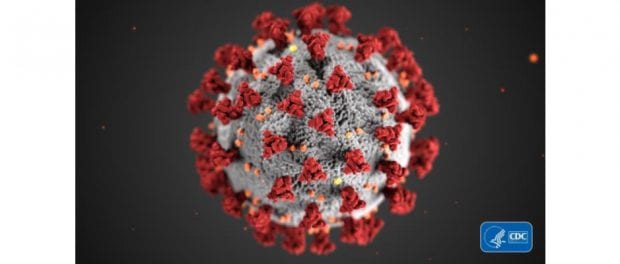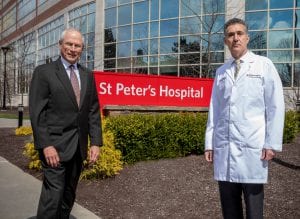St. Peter’s Health Partners Battling COVID-19 with Groundbreaking Therapies, Interdisciplinary Care

While the battle against the novel coronavirus (COVID-19) rages on across the United States and the world, multiple groundbreaking therapies to treat the sickest COVID-positive patients in the Capital Region are being employed at St. Peter’s Health Partners‘ (SPHP) acute care hospitals in Albany and Troy.
At St. Peter’s Hospital in Albany and Samaritan Hospital in Troy, COVID-19 patients are being treated with a variety of therapeutic methods including: the antiviral drug remdesivir; IL-6 inhibitor drugs; macrophage inhibitors; and convalescent blood plasma therapy. These experimental therapies are being deployed alongside the compassionate, patient-centered care for which St. Peter’s Health Partners has always been recognized.

James K. Reed, M.D., president and CEO of SPHP, and Steven Hanks, M.D., chief clinical officer, SPHP
“I am so proud of our team of physicians and health care providers who have been leading the charge in bringing these experimental treatments to our patients,” said James K. Reed, M.D., president and CEO of St. Peter’s Health Partners. “Not only have they been treating our sickest patients, they have also been working tirelessly behind the scenes to secure access to the most promising options available. Their success in getting these studies off the ground so early in this pandemic fight shows their dedication to delivering the highest quality of medicine to our patients and further reinforces our mission to be a compassionate, transformative healing presence in our community.”
SPHP is the first in the region to use remdesivir, an experimental antiviral drug, in select patients at St. Peter’s Hospital, said Philip Palmieri, M.D., St. Peter’s Hospital’s chief of infectious disease. The World Health Organization has identified remdesivir as one of the most promising treatments in treating COVID-19-positive patients and it has already been given to more than 1,700 COVID-19 patients around the world, with thousands more receiving it in trials in the US. Studies have shown remdesivir has excellent results against other viruses and coronaviruses, including those behind Severe Acute Respiratory Syndrome (SARS) and Middle East Respiratory Syndrome (MERS).
Although traditionally used to treat a variety of rheumatologic diseases, IL-6 inhibitor drugs have been administered to patients at both St. Peter’s Hospital and Samaritan Hospital, said Dr. Palmieri. The drugs are given to quiet the “cytokine storm,” which is what is believed to lead to acute respiratory distress syndrome (ARDS).
“The cytokine storm causes white blood cells to activate a variety of chemicals that can leak into the lungs, filling them with more fluid, making it harder and harder to breathe,” said Dr. Palmieri. “The elderly and those with other health conditions are particularly vulnerable to this reaction. When the immune system overacts, severe damage to the lungs is the result.”
He noted that a macrophage inhibitor (acalbrutinib) has also been given to patients at St. Peter’s Hospital for the same reason IL-6 was used — to help in the effort to quiet the cytokine storm, reduce lung damage, and provide a better pathway to potential recovery.
The IL-6 and macrophage inhibitor treatments are considered FDA off-label use, which is why it is so critical that physicians providing treatments of this nature are in constant contact with other major medical centers around the nation, sharing the latest research, and discussing available treatments, Dr. Palmieri noted.
“Our patients are scared. Their families are scared. We are just at the beginning of understanding this virus — how it spreads and how it sickens its host,” said Alan Sanders, M.D., chief medical officer for SPHP acute care. “As there is no proven treatment right now, it is critically important that these therapeutic methods are studied, because if administered in the right patient, they can be a ray of hope.”
St. Peter’s Hospital and Samaritan Hospital are also among the first hospitals in the country to obtain Food and Drug Administration (FDA) approval to treat critically ill patients infected by COVID-19 with blood plasma from a COVID-19 survivor.
Convalescent plasma therapy takes plasma from a survivor of an infectious disease that is filled with that person’s antibodies to the disease. These antibodies can then be shared with an individual currently fighting the disease, giving them a powerful boost to their immune system to fight off the effects of the disease and accelerate their recovery.
Three patients in St. Peter’s Hospital’s intensive care unit have been identified as potential recipients of antibody-rich plasma from a donor in New York City. The hospital’s Convalescent Plasma Team (CPT) will have the plasma in hand in the next few days to begin administering the treatments. SPHP’s CPT is directed by Jorge Cerda, M.D., chief of the department of medicine and principal investigator for St. Peter’s Hospital, and Jennifer Garbaini, M.D., assistant medical director and principal investigator for Samaritan Hospital. David Palat, M.D., has had a critical role on the team as the liaison to facilitate the New York City donation.
St. Peter’s participation in the use of these plasma treatments has been possible through a nationwide study overseen by the Mayo Clinic. In addition to the scheduled plasma delivery, St. Peter’s is also seeking plasma donors locally for further research.
Eligible donors must be fully recovered from COVID-19 with no symptoms for at least 14 days. Candidates will then be retested to ensure the virus is no longer active in their system. Once approved, the donations will be collected by the American Red Cross, following the protocols for their regular blood donations.
“We need your help,” said Dr. Cerda. “If you or someone you know has recovered from a positive, verified COVID-19 diagnosis, I ask you to go to www.redcrossblood.org and click on ‘Potential Donor and Fully Recovered from COVID’ to register.”
Dr. Garbaini echoed Dr. Cerda’s comments, noting: “Every day is a good day to help save a life, but we have never needed your help more than right now. If you can donate, we encourage you to do so and we thank you from the bottom of our hearts.”
The community is reminded that the CDC has the most current information about the virus, including everything you need to know about how the virus spreads, how it’s treated, how to protect yourself, and what to do if you get sick. You can learn more by visiting the CDC website, which is updated frequently.







